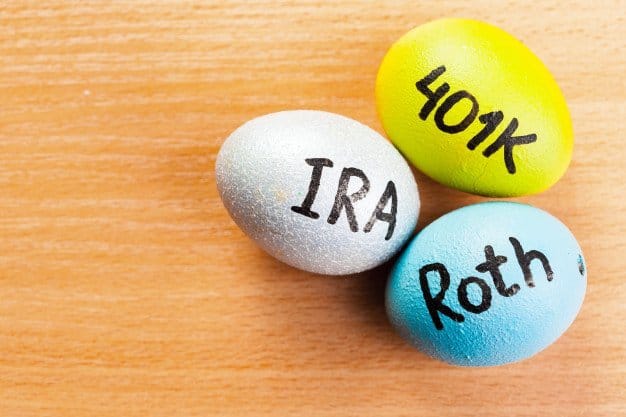A ROTH IRA is an important investment “folder” where you can buy/sell assets (stocks, bonds, ETFs, mutual funds, etc..) with the intention of not touching that money until you’re retired.
Named after Senator William Roth, the Roth IRA was introduced as part of the Taxpayer Relief Act of 1997.
The biggest appeal to a ROTH IRA is that your money is taxed now when you invest it, so the number you see growing in your account over the years is 100% yours.
This is the opposite of a 401k, where you are tax deferring and will get hit with the taxes later on when you withdraw the money.
I started my ROTH IRA around 2013. In 2012 I first drafted my savings plan and started working on my emergency fund, so in 2013 I finally had some buffer to start moving some of my saving money towards investing.
I created my account at TRowePrice (there are a lot of great companies to choose from), and would put in what I can.
Over the years I got to the point where I could max out both ROTH IRA accounts for my wife and I.
Here’s what I didn’t know until a few years after I opened it.
- Just like I said before, think of your ROTH IRA account as a folder, where you can buy a bunch of things and keep it in here.
- In the first few years, I just bought mutual funds, then after realizing I could house lots of different things in my ROTH IRA I started buying individual stocks.
- I’d buy stocks of companies I knew would be around 20+ years from now, and could potentially grow tremendously and give me great returns.
- There’s an income cap, so if you’re married and file your taxes jointly with your spouse, you can’t make over $196k and still get the benefits of the ROTH IRA. At that income level, it’s a nice problem to have, but you can find strategies like a backdoor ROTH IRA useful when your income gets really high.
Let’s talk about the biggest question everyone has with a ROTH IRA vs. 401k. And that is…
Which one do I choose? ROTH IRA or 401k? Is it better to be taxed now or later?

To be frank, it depends on your situation.
So if you have a friend or a financial expert tout one “folder” or another, you can hear out their reason, but know that you still gotta figure things out for yourself.
Let’s talk about why you’d want to be taxed now, and why you’d wanna be taxed later.
Why get taxed now?
- You prefer seeing the true money number in your account, it’s 100% yours.
- You’ll be in a lower tax bracket now, than later down the road. This is true for those who are anticipating continued growth in their career and know that they’ll be making much more at 65 than they are now. In that case, you take the tax hit now, since it will be lower than later.
Why defer taxes until later?
- You believe that the more money you throw at your investments now will snowball into a bigger number later down the road.
Another benefit of the Roth IRA is that you could let it grow, and essentially pass it on to your descendants. As long as beneficiaries are specified correctly, the decendendants of the Roth IRA can claim the value of that account tax free.
This is where generational wealth becomes tremendously important, creating wealth for your lineage.
I had a mentor share his insights about how his large share in a certain stock wouldn’t do too much in his lifetime, but by the time his own kids were grandparents, the value would amount to over $150 million dollars.
I didn’t mistype that. From the modest growth in his portfolio, which started at $100k, the value in his funds could be transferred to his great-grandchildren at a tremendous value.
What happens if you contribute to your Roth IRA but at the end of the year, you realize your income was higher than the maximum allowed by the IRS?

This can happen often if your job type is more performance based (like a salesperson) or you got a nice job promotion towards the end of the year and it kicks you out of the $206k absolute maximum limit.
You can refer to the official IRS doc, but basically, if you file jointly and make over $196k this year, your contribution amount is limited.
Once you both make over $206k combined, you’re not eligible for the ROTH IRA at all.
I mentioned this earlier in the post, but this is when a backdoor ROTH IRA can become useful.
If you are in this situation, head over to that page to learn more, as this post was dedicated to be a fairly complete guide in understanding, starting, and reviewing your ROTH IRA while you were well within the income limits.
If i’m starting out, what do I invest in?
I get asked this question often when I advise friends/family to start their own ROTH IRA account.
Honestly, if you’re starting out and asking that question, then most likely you’re not familiar & comfortable with investing in individual stocks
The best bet here then is to invest in the overall market.
Depending on where you open your ROTH IRA account, you can try to find the lowest fee mutual fund that covers most of the market.
For example, if you opened your account at Vanguard, then you might want to look into the VTSAX fund to continuously invest every month and have your investments diversified.
Things I wish I knew when I first started my ROTH IRA
This is for 2013 me, when I first opened my ROTH IRA. I would have advised that old me..
- That you can invest in many different things, and just have them inside your ROTH IRA account. That could be stocks, mutual funds, CDs, even real estate.
- That the big killer, in the long run, is the fees. Mutual funds have fees, and some can be high. A 1% fee looks decent, but it can bite away at your earnings. So do your best to keep it as low as possible, my personal rule is to never buy any mutual fund that’s over 0.50% management fee.
- That time is the biggest factor in your success. The earlier you open your ROTH IRA and start funding it regularly, the wealthier you’ll be later on. Time is the biggest factor in your success, that compounding effect of your money over the years is just magical.
- That you don’t need to look at your account daily. I now keep it limited to 1-2 times a month. Aside from that, we’re in it for the long haul, so why does it matter that my investments went up 2% one week and down 1% the other. It will just mess with your head.
What are those target year funds everyone talks about?
So your ROTH IRA is an account you made to save money to use for after retirement.
The goal is to grow your money over time, and ideally have it diversified to reduce risk.
Those target funds (ie. 2020 fund or 2030 fund) are there to help take care of the job of rebalancing your account over the years and reducing risk over time as you get closer to your retirement period.
Say you will retire in 2050, and you buy that mutual fund and regularly add money to it.
Without doing any additional work, the manager of that fund will make sure that the allocation of different asset types in that fund are all good to go over the years.
The fund manager will also update the fund over time so that it’s riskier now (but will get you possibly returns) and much less riskier when you’re ready to retire (so your money is more predictable towards the end)

